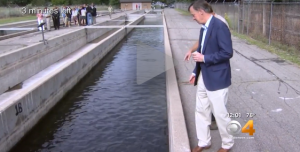Six days after the EPA unleashed a torrent of mine waste down the Animas River, Gov. Hickenlooper finally took time out of his schedule to tour the Durango Fish Hatchery and Wildlife Museum to feed the fish and pose for photographs.
Hick later moseyed down to the river that just days ago ran orange and was not at all suitable for a photo op, and declared that no wildlife had been harmed in the making of this disaster.
The EPA’s a great partner and was doing everything humanly possible to make sure this never happened again, Hick declared.
And by prevention, Hick explained that the EPA should go poking around in thousands of other abandoned mines across the West. And as we now know, that worked out just swell last week.
Hickenlooper certainly took his sweet time getting over there to address the disaster, which has been national news since last week.
To put the time delay in political perspective, President Bush was harshly criticized for waiting nearly four days to visit the Gulf Coast after Hurricane Katrina, and he had to contend with a completely decimated infrastructure.
We’re pretty sure Hickenlooper didn’t travel to Durango by boat, so we’re at a loss to explain his six-day delay.
Hick did make time to visit Aspen yesterday to talk about the awesomeness of the EPA’s latest “clean air” plan that would shut down even more mines and raise Coloradans’ electricity prices.
As a peace offering of sorts for his unexplainable delay, Hick did bring along with him a gift for the EPA — $500,000 in taxpayer dollars to help clean up the mess they caused.
Hick’s was a strikingly different reaction than that of U.S. Sen. Cory Gardner, who toured the area days ago and today is demanding congressional hearings to hold the agency responsible and ensure the EPA is held to the same recovery standards as the private sector.
Gardner disagrees with Hick that the EPA has been a terrific partner in all of this:
“Although the EPA has finally acknowledged the magnitude of the crisis, its ongoing lack of communication and coordination must be rectified. The local communities and industries that rely on the river for their livelihoods deserve transparency, accountability, and an explanation that is far-past due,” Gardner said.


Katrina? Really?
How many people are now homeless?
Value of property damage?
Did he walk on the ground or just fly over as The Shrub did with New Orelans?
I can hardly wait until the BLM or the Forest Service has anothe (un)controlled burn. I'm sure he'll be on top of that as well.